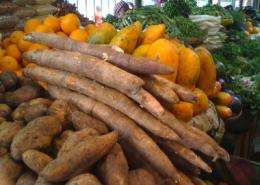Cassava - not always so healthy

Cassava based products are establishing a growing foothold in the Australian health food market, however, new research shows that some imported products contain dangerous levels of the poison cyanide.
A staple food for around 800 million people, the root of the cassava plant, when not properly processed, contains cyanide, which can cause nausea, vomiting, diarrhoea, dizziness, weakness and death.
New research carried out by Asssociate Professor Ros Gleadow, Dr. Anna Burns and Dr. Timothy Cavagnaro of Monash University’s School of Biological Sciences, together with Dr. J. Howard Bradbury from the Australian National University, tested the cyanide content of a number of products currently available in Melbourne and Canberra.
The testing occurred both before and after the introduction by Food Standards Australia and New Zealand (FSANZ) of a recommended cyanide limit of ten parts per million.
Associate Professor Gleadow said the results indicated that while highly processed products and those manufactured in Australia since January 2011 adhered to food safety standards, some imported products contained relatively high levels of the poison.
“The most alarming example of this trend is 262 ppm in one brand of cassava chips. A child weighing 20 kg would need to eat 40g to 270g of these chips to reach the lethal dose - potentially that’s just one bag of chips.
“The safety standards are having a positive effect, but it’s not clear that there’s any testing or enforcement occurring, which is worrying. We would advocate the introduction of proper labelling and enforcement of the safety standards.”
Professor Gleadow said that because cassava-based food was not widely consumed in Australia, it was not perceived as a risk.
“If you look to African and Asian countries, where cassava is a significant part of people’s diets, the risks of consuming large amounts of the unprocessed root are clear. One of the most devastating results of a monotonous cassava-based diet is Konzo, a disease which can cause permanent paralysis.”
The research has been published in the Journal of Food Composition and Analysis.

















